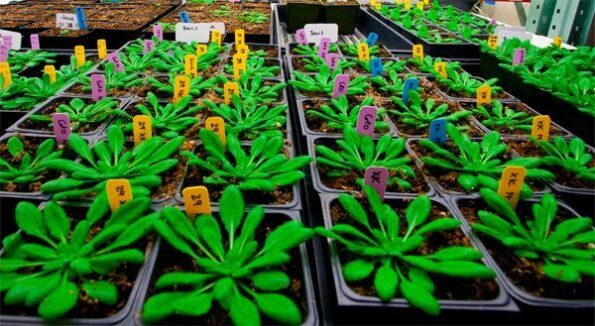A powerful new tool that can help advance the genetic engineering of “fuel” crops for clean, green and renewable bioenergy, has been developed by researchers with the U.S. Department of Energy (DOE)’s Joint BioEnergy Institute (JBEI), a multi-institutional partnership led by Lawrence Berkeley National Laboratory (Berkeley Lab). The JBEI researchers have developed an assay that enables scientists to identify and characterize the function of nucleotide sugar transporters, critical components in the biosynthesis of plant cell walls.
“Our unique assay enabled us to analyze nucleotide sugar transporter activities in Arabidopsis and characterize a family of six nucleotide sugar transporters that has never before been described,” says Henrik Scheller, the leader of JBEI’s Feedstocks Division and a leading authority on cell wall biosynthesis. “Our method should enable rapid progress to be made in determining the functional role of nucleotide sugar transporters in plants and other organisms, which is very important for the metabolic engineering of cell walls.”
Scheller is the corresponding author, along with Ariel Orellana at the Universidad Andrés Bello, Santiago, Chile, of a paper describing this research in the Proceedings of the National Academy of Sciences (PNAS). The paper is titled “The Golgi localized bifunctional UDP-rhamnose/UDP-galactose transporter family of Arabidopsis.” The lead authors are Carsten Rautengarten and Berit Ebert, both of whom hold appointments with JBEI, and both of whom, like Scheller, also hold appointments with Berkeley Lab’s Physical Biosciences Division. (See below for the full list of co-authors.)
The sugars in plant biomass represent an enormous potential source of environmentally benign energy if they can be converted into transportation fuels – gasoline, diesel and jet fuel – in a manner that is economically competitive with petroleum-based fuels. One of the keys to success in this effort will be to engineer fuel crops whose cells walls have been optimized for sugar content.
With the exception of cellulose and callose, the complex polysaccharide sugars in plant cell walls are synthesized in the Golgi apparatus by enzymes called glycosyltransferases. These polysaccharides are assembled from substrates of simple nucleotide sugars which are transported into the Golgi apparatus from the cytosol, the gel-like liquid that fills a plant cell’s cytoplasm. Despite their importance, few plant nucleotide sugar transporters have been functionally characterized at the molecular level. A big part of the holdup has been a lack of substrates that are necessary to carry out such characterizations.
“Substrates of mammalian nucleotide sugar transporters are commercially available because of the medical interest but have not been available for plants, which made it difficult to study both nucleotide sugar transporters and glycosyltransferases,” Scheller says.
For their assay, Scheller, Rautengarten, Ebert and their collaborators, created several artificial substrates for nucleotide sugar transporters, then reconstituted the transporters into liposomes for analysis with mass spectrometry. The researchers used this technique to characterize the functions of the six new nucleotide sugar transporters they identified in Arabidopsis, a relative of mustard that serves as a model plant for research in advanced biofuels.
“We found that these six new nucleotide sugar transporters are bispecific, which is a surprise since the two substrates are not very similar from a physical standpoint to the human eye,” Scheller says. “We also found that limiting substrate availability has different effects on different polysaccharide products, which suggests that cell wall polysaccharide biosynthesis in the Golgi apparatus of plants is also regulated by substrate transport mechanisms.”
In addition to these six nucleotide sugar transporters, the assay was used to characterize the functions of 20 other transporters, the details of which will soon be published.
“Thanks largely to the efforts these past two years of Carsten Rautengarten and Berit Ebert, we now know the activity of three times more nucleotide sugar transporters than are known in humans, and we have determined the function of two-thirds of the plant transporters as compared to one-quarter of the human ones,” Scheller says. “This is a tremendous accomplishment and we are already using this information at JBEI to improve biomass sugar composition for biofuel production.”
Other co-authors of the PNAS paper reporting this research were Ignacio Moreno, Henry Temple, Thomas Herter, Bruce Link, Daniela Doñas-Cofré, Adrián Moreno, Susana Saéz-Aguayo, Francisca Blanco, Jennifer Mortimer, Alex Schultink, Wolf-Dieter Reiter, Paul Dupre, Markus Pauly and Joshua Heazlewood.
This research was supported by the DOE Office of Science.
Additional Information
For more about the research of Henrik Scheller go here
For more about the Joint BioEnergy Institute go here
For more about Berkeley Lab’s Physical Biosciences Division go here
Lawrence Berkeley National Laboratory addresses the world’s most urgent scientific challenges by advancing sustainable energy, protecting human health, creating new materials, and revealing the origin and fate of the universe. Founded in 1931, Berkeley Lab’s scientific expertise has been recognized with 13 Nobel prizes. The University of California manages Berkeley Lab for the U.S. Department of Energy’s Office of Science. For more, visit www.lbl.gov.
The DOE Office of Science is the single largest supporter of basic research in the physical sciences in the United States and is working to address some of the most pressing challenges of our time. For more information, please visit science.energy.gov.











